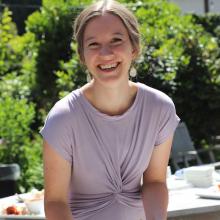Elisabeth Gross
Why did you decide to pursue a graduate degree?
Since the start of my undergraduate degree in psychology, I knew I wanted to take my education further and become a health professional. I had always considered myself a "helper" and I desired to serve and empower others toward health and healing. From there began the journey of refining my goal to a profession that connected with my strengths, interests, and values. Once I landed on occupational therapy, naturally, I decided to pursue a graduate degree.
Why did you decide to study at UBC?
Having enjoyed my undergraduate degree at UBC, it was an obvious top-choice for me. The connections I had made while at UBC and living in Vancouver was a large factor for me. Beyond this, I knew that UBC was recognized as having one of the best occupational therapy programs in the country - how could I pass that up!
What is it specifically, that your program offers, that attracted you?
I was most drawn to the small class size, expansive and quality fieldwork opportunities, and innovative program content of my program. UBC's MOT program has the smallest cohort per year, which means the students can build a great community and you're more likely to build relationships with professors. I also knew that UBC's MOT program had more hours of fieldwork placements than other programs, and it was important to me to have these quality practical learning experiences. I was also aware that the MOT program here at UBC aims to keep the curriculum relevant to current times and issues faced in the profession and society, something that I think is important to becoming a competent clinician.
What was the best surprise about UBC or life in Vancouver?
There are so many fun things to do! There are endless coffee shops to explore and restaurants representing many corners of the world. Nature is quite accessible and, as someone who enjoys bike riding, I have been pleasantly surprised at how bike accessible the city is.
What aspects of your life or career before now have best prepared you for your UBC graduate program?
My previous studies at UBC, work as a research assistant in an occupational therapy lab, and experiences working with children I believe have best prepared me for the UBC MOT program. UBC is academically rigorous, and I believe completing my undergraduate degree here prepared me for the next step up at the graduate level. I had the opportunity to volunteer and then work in a research lab in UBC's occupational therapy department, which not only provided me with amazing connections and mentors but developed my critical analysis, writing skills, and sparked new interests for me - all of which have been invaluable in the MOT program. Other experiences, like working with children, taught me flexibility, problem-solving, and patience, skills which I use every day as an MOT student!
What do you like to do for fun or relaxation?
Baking and getting outdoors are my go-to's for resting and re-energizing. Even better is a combination of the two, a nice long bike ride and picking up your favourite baked treat with a coffee.
What advice do you have for new graduate students?
I would tell new graduate students to enjoy what you are learning and who you are becoming. You've worked your heart out to get into the program you are in today, so soak it in. You're learning to become a competent clinician or researcher, writer or musician (to name a few) - what a beautiful journey that is.


